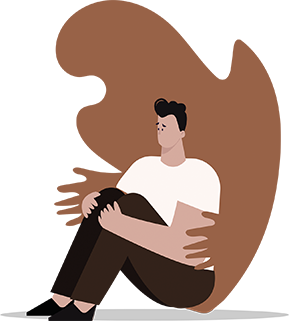Have Questions?
Personality Disorder

Personality Disorder
A Personality Disorder (PD) is a mental health condition characterized by deeply ingrained, unhealthy patterns of thinking, feeling, and behaving. These patterns cause distress and difficulties in personal relationships, work, and daily life. Personality disorders usually develop in adolescence or early adulthood and persist over time.
Types of Personality Disorders:
Personality disorders are grouped into three clusters based on similar characteristics:
- Cluster A: Odd or Eccentric Behavior
- Paranoid Personality Disorder (PPD) – Extreme distrust and suspicion of others.
- Schizoid Personality Disorder – Emotional detachment, limited social interactions, and preference for solitude.
- Schizotypal Personality Disorder – Unusual thoughts, eccentric behavior, and discomfort in close relationships.
Cluster B: Dramatic, Emotional, or Erratic Behavior
- Borderline Personality Disorder (BPD) – Intense emotions, unstable relationships, impulsive behavior, and fear of abandonment.
- Narcissistic Personality Disorder (NPD) – Exaggerated self-importance, lack of empathy, and need for admiration.
- Histrionic Personality Disorder (HPD) – Excessive attention-seeking, emotional instability, and dramatic behavior.
- Antisocial Personality Disorder (ASPD) – Disregard for others' rights, impulsivity, and lack of remorse.
Cluster C: Anxious or Fearful Behavior
- Avoidant Personality Disorder (AvPD) – Extreme sensitivity to criticism, social withdrawal, and low self-esteem.
- Dependent Personality Disorder (DPD) – Excessive reliance on others, fear of being alone, and difficulty making decisions.
- Obsessive-Compulsive Personality Disorder (OCPD) – Perfectionism, rigidity, and a strong need for control (different from OCD).
Common Signs & Symptoms of Personality Disorders:
- Rigid and unhealthy patterns of thinking
- Difficulty managing emotions and relationships
- Distorted self-image and identity issues
- Impulsive or risky behaviors
- Fear of abandonment or social withdrawal
- Intense mood swings or emotional instability
- Difficulty handling criticism or stress
Causes & Risk Factors:
- Genetic Factors – Family history of personality disorders or mental illness.
- Childhood Trauma – Abuse, neglect, or unstable family environments.
- Brain Structure & Chemistry – Abnormalities in brain function affecting emotional regulation.
- Environmental & Social Influences – Stress, dysfunctional relationships, or cultural factors.
Diagnosis & Treatment:
- Psychological Evaluation – A psychiatrist or psychologist assesses thoughts, emotions, and behaviors.
- Cognitive Behavioral Therapy (CBT) – Helps challenge negative thought patterns and improve coping skills.
- Dialectical Behavior Therapy (DBT) – Specifically effective for Borderline Personality Disorder (BPD).
- Medications – Antidepressants, mood stabilizers, or anti-anxiety medications may help manage symptoms.
- Lifestyle Changes – Exercise, mindfulness, and stress management techniques improve mental well-being.
- Support Groups & Therapy – Family therapy and peer support can be beneficial.



